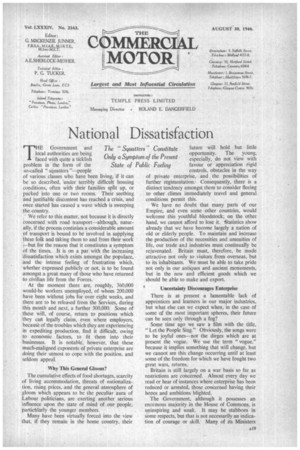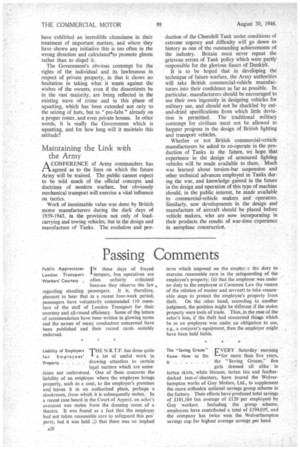National Dissatisfaction
Page 21

Page 22

If you've noticed an error in this article please click here to report it so we can fix it.
THE Government and local authorities are being faced with quite a ticklish problem in the form of the so-called "squatters "—people of various classes who have been living, if it can be so described, Sunder terribly difficult housing conditions, often with their families split up, or packed into one or two rooms. Their seething and justifiable discontent has reached a crisis, and once started has caused a wave which is sweeping the-country.
We refer to this matter, not because it is directly concerned with road transport—although, naturally, if the process continues a considerable amount of transport is bound to be involved in supplying these folk and thking them to and from their work i—but for the reason that it constitutes a symptom of the times. It is on a par with the increasing 'dissatisfaction which exists amongst the populace, and the intense feeling of frustration which, whether expressed publicly or not, is to be found amongst a great many of those who have returned to civilian life from the Forces.
At the moment there are, roughly, 360,000 would-be workers unemployed, of whom 200,000 have been without jobs for over eight weeks, and there are to be released from the Services, during this month and next, a further 300,000. Some of these will, of course, return to positions which they can legally claim, even where employers, because of the troubles which they are experiencing in expediting production, find it difficult. owing to economic factors, to fit them into their businesses. It is notable; however, that these much-maligned exponents of private enterprise are doing their utmost to cope with the position, and seldom appeal.
Why This General Gloom?
The cumulative effects of food shortages, scarcity of living accommodation, threats of nationalization, rising prices, and the general atmosphere of gloom which appears to be the peculiar aura of Labour politicians, are exerting another serious influence upon the state of mind of our people, partinTarly the younger members.
Many have been virtually forced into the view that, if they remain in the home country, their future will hold but little opportunity. The young, especially, do not view with favour or appreciation rigid controls, obstacles in the way of private enterprise, and the possibilities of further regimentation.Consequently, there is a distinct tendency amongst them to consider fleeing to other climes immediately travel and general conditions permit this.
We have no doubt that many parts of our Empire, and even some other countries, would welcome this youthful bloodstock; on the other hand, we cannot afford to lose it. .Statistics show already that we have become largely a nation of old or elderly people. To maintain and increase the production of the necessities and amenities of life, our trade and industries must continually be rejuvenated. Britain must, therefore, be made attractive not only to visitors from overseas, but to its inhabitants. We must be able to take pride not only in our antiques and ancient monuments, but in the new and efficient goods which we should be able to make and export.
Uncertainty Discourages Enterprise There is at present a lamentable lack of apprentices and learners in our major industries, but what else can we expect when, in the ease of some of the most important spheres, their future can be seen only through a fog?
Some time ago we saw a film with the title, " Let the People Sing." Obviously, the songs were to be joyful ones—not the dirges which are at present the vogue. We use the term "vogue," because it implies something that will change, but we cannot see this change occurring until at least some of the freedom for which we have fought two great wars, returns.
Britain is still largely on a war basis so far as restrictions are concerned. Almost every day we read or hear of instances where enterprise has been reduced or arrested, those concerned having their hopes and ambitions blighted.
The Government, although it possesses an enormous majority in the House of Commons, is uninspiring and weak. It may be stubborn in some respects, but that is not necessarily an indication of courage or skill: Many of its Ministers have exhibited an incredible clumsiness in their treatment of important matters, and where they have shown any initiative this is too often in the wrong direction and calculatedito promote gloom rather than to dispel it.
The Government's obvious contempt for the rights of the individual and• its lawlessness in respect of private property, in that it shows no hesitation in taking what it wants against the wishes of the owners, even if the dissentients be in the vast majority, are being reflected in the existing wave of crime and in this phase of squatting, which has been extended not only to the seizing of huts, but to " pre-fabs " already on a proper roster, and even private houses. In other words, it is really the Government which is squatting, and for how long will it maintain this attitude?
Maintaining the Link with the Army
ACONFERENCE of Army commanders has agreed as to the lines on which the future Army will be trained. The public cannot expect to be told much of the official concepts and doctrines of modern warfare, but obviously mechanical transport will exercise a vital influence on tactics.
Work of inestimable value was done by British motor manufacturers during the dark days of 1939-1945, in the provision not only of loadcarrying and towing vehicles, but in the design and manufacture of Tanks. The evolution and pro duction of the Churchill Tank under conditions of extreme urgency and difficulty will go down to history as one of the outstanding achievements of the industry. Britain must never repeat the grievous errors of Tank policy which were partly responsible for the glorious fiasco of Dunkirk.
It is to be hoped that in developing the technique of future warfare, the Army authorities will take British commercial-vehicle manufacturers into their confidence as far as possible. In particular, manufacturers should be encouraged to use their own ingenuity in designing vehicles for military use, and should not be shackled by cutand-dried specifications from which little deviation is permitted. The traditional military contempt for civilians must not be allowed to haroper progress in the design of British fighting and transport vehicles.
Whether or not British commercial-vehicle manufacturers be asked to co-operate in the production of Tanks in the future, we hope that experience in the design of armoured fighting vehicles will be made available to them. Much was learned about torsion-bar suspension and other technical advances employed in Tanks during the war, and knowledge gained in the future in the design and operation of this type of machine should, in the public interest, be made available to commercial-vehicle makers and operators. Similarly, new developments in the design and manufacture of aircraft should be placed before vehicle‘ makers, who are now incorporating in their products the results of war-time experience in aeroplane construction.




































































